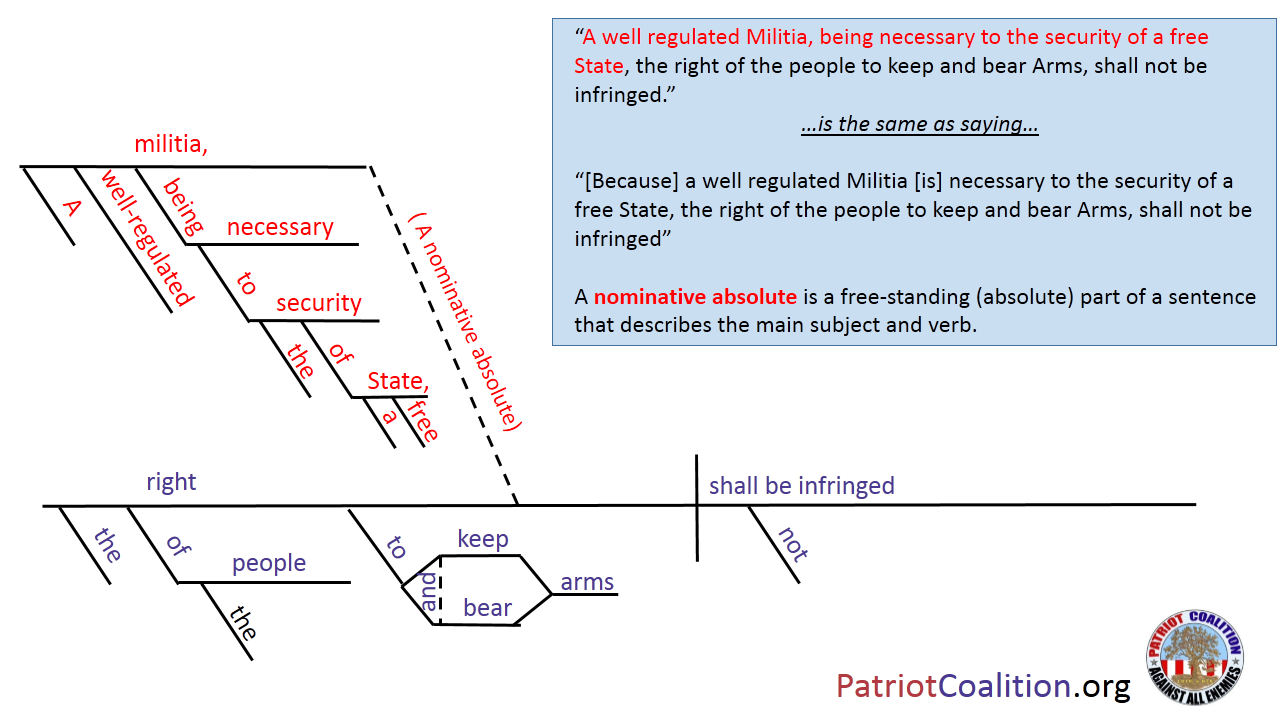The 2nd Amendment Means What it Says
Recent threats of gun control by those in both major parties, as well as the President of the United States, have once again thrust the 2nd Amendment into the spotlight. While observing many of the debates around this topic, it has become apparent to me that many (on both sides of the argument) have been unduly influenced or distracted by the various Supreme Court decisions. But it is more than that: they are under the false impression that the Supreme Court of the United States is the final arbiter of the Constitution, even if their opinions are contrary to the actual text.
It is worth repeating that the Constitution was written for the average citizen to understand–without the aid of an attorney. After so much oppression and abuse from the British government, does it not stand to reason that if the colonists risked so much to form their own government, that they would be very careful about how it was worded to protect their God-given liberties. For them to consider ratifying through their state legislatures, the average man would need to read and be able to understand the document. It had to be simply stated so that each of them would understand the limits of his new government in order for him to cast his support for or against.
So, let us start with the text of the 2nd Amendment itself. After all, it is from here that all the authority and debate begins.
“A well regulated militia, being necessary to the security of a free state, the right of the people to keep and bear arms, shall not be infringed.”
Like all sentences, the ability to understand this one lies in its grammar. While you don’t need to know the technical terms for it, the average reader can see that the subject and predicate stand on their own: “the right…shall not be infringed.” It is not dependent on the free-standing clause about the militia. This cannot be debated by anyone who holds a claim to rationality or reason. And in a constitutional republic such as ours, where the words of our foundational law have meaning, this should be the end if the “if you’re not part of a militia, you shouldn’t own a gun” argument. So why did the Framers include the clause? To ensure that the people understood why the amendment was so important. It is one of the few places in the Constitution where the reasoning is included in the text. This alone should make us sit up and pay attention!

The common-sense of the militia clause should not need any clarification, but since many have lost sight of it, I’ll explain it here. There are two sources from where the threat of oppression to our security as a free state may come: 1) our own government(s), and 2) foreign powers. From each threat, the ultimate means to establish an oppressive regime would be force of arms.
Now, you might argue that we have at least two considerable layers of protection from such threats: the national armed forces, and our state national guards. But what if those forces are co-opted? Or even worse are the source of the threat? How will we counter such a threat? This is where the militias of old played a part. You see, militias were not only a creature of the state or general government. They were organized by the citizens of any geographic area for mutual defense against any physical threat–the proverbial “safety in numbers” concept. You couldn’t always rely on an organized, government force arriving in time to defend your liberties, or for that matter trust them not to be the aggressors themselves! Has much changed today? You have probably heard the phrase, “when seconds count, the police are only minutes away.” Unfortunately, back in 1903, the Dick Act did away with traditional militias and replaced them with our current system of the National Guard. Our “militias” have been federalized.
So now that we are no longer in control of our local militias, are we just supposed to trust that one of our governments (local, state, or national) will save us from the threat of oppression? No! That is why the Framers wrote the 2nd Amendment to simply state “the right of the people to keep and bear Arms, shall not be infringed.” Because, even without militias, the last available defense against oppression is the force of arms.
The other argument that always surfaces is the classification of the term “Arms.” Assault-weapons, military-style weapons, size of magazines, semi- or fully-automatic, bump stocks, etc. This diversionary tactic is simply addressed by referring to the reason we have a 2nd amendment. Imagine in the early 19th century if wild-eyed Canadians decided they wanted to invade America. Should the militias only use pistols to defend themselves? Or would they be able to defend themselves better with pistols, rifles, cannons and anything else they can get their hands on?
Fast forward to today. If we are to defend ourselves against potential oppressors, why on Earth would we limit ourselves to pistols, or semi-automatic rifles. Do we expect our would-be oppressors to show up with only the same? Of course not! Even more relevant: do we reasonably think that the Framers would have limited the citizens’ ability to defend themselves against the most powerful threat in the world at any given time simply because certain individuals may abuse their right?
Isn’t the government’s attempts to pass unconstitutional enactments forcing us to limit the type of weapons we have similar to the “fox guarding the hen house”? After all, they are one of the two potential sources of oppression, aren’t they? This is why the right to keep and bear arms is codified in an amendment to the Constitution; precisely so the government would have to get three-fourths of the state legislatures (and their constituencies) to agree before it can be changed. It was supposed to be hard to change!
Those who like to use the term “common-sense gun laws” conveniently like to forget about the original “common-sense gun law.”
And yet, we just keep nodding our heads to the Supreme Court thinking they are the wisest and most unbiased of us all. We keep allowing the conversation to be about emotions rather than the law. We keep accepting de facto changes to the Constitution in the form of unconstitutional enactments.

It was the primary author of the Constitution, James Madison who said, “I believe there are more instances of the abridgement of freedoms of the people by gradual and silent encroachment of those in power than by violent and sudden usurpations.”
Despite the rhetoric and emotion, we are either a nation of laws or we are not.
Words do mean something. To limit is to infringe.
If you want to limit at all, you better start drafting a repeal amendment.








